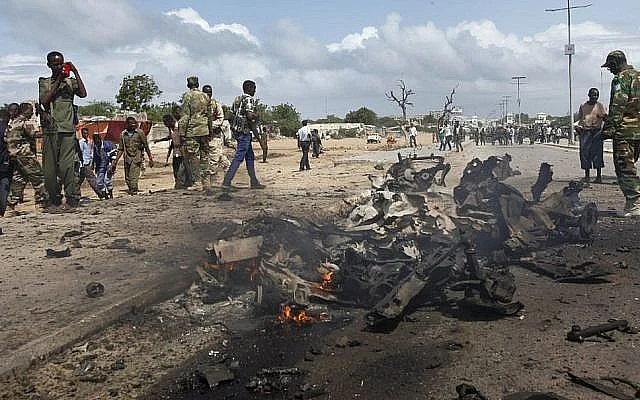Ten years after declaring a short-lived caliphate in the Nigerian town of Gwoza, just across the border with Cameroon, Islamic extremists deployed female suicide bombers there — their first in the conflict-battered region since 2020 — to sound an alarm: One of the world's longest wars is still happening.
The first of the three coordinated suicide bombings on June 30 targeted a well-attended wedding. The second was detonated at the burial ceremony for the victims, and the third at a hospital attending to those injured.
At least 32 people in total were killed in the attacks, including nine family members and friends of Mohammed Kehaya, a resident who is now worried about his safety in Borno state, the hotbed of the Islamic militancy that started in 2009.
Nigeria Defence Chief Gen. Chris Musa said the attacks were not a setback for the military but “a sign of desperation," describing them as a one-off by the extremists who once took the world by surprise when they kidnapped hundreds of schoolgirls in Borno in 2014.
“Some individuals would do everything possible for us not to succeed,” Gen. Musa said of the attackers.
However, several security analysts and locals interviewed about the bombings echoed concerns that the attacks must have taken a lot of planning and coordination and portend danger in Borno, where some villages lack security presence.
One of the extremists' goals could be to distort the narrative that the security situation in the region has normalised, said Vincent Foucher, consulting senior analyst for West Africa at the International Crisis Group.
“It's a way to show the war goes on,” Foucher said.
No group has claimed responsibility for the bombings, but blame quickly fell on Boko Haram, which since 2009 has launched an insurgency to establish their radical interpretation of Islamic law, or Sharia, in northeastern Nigeria. They have since splintered into different factions, together accounting for the direct deaths of at least 35,000 people and the displacement of more than 2 million amid a humanitarian crisis with people in dire need of foreign aid.
Two days before the bombings, Nigerian military spokesperson Maj. Gen. Edward Buba was meeting with reporters in the capital, Abuja, where he spoke of successes recorded by security forces in their war against extremists. Even while admitting it would “take time and effort to completely destroy” them, he repeated a phrase frequently said among Nigerian officials: “We have greatly degraded the terrorists.”
In Borno, however, the bombings sent shock waves across families and left many wondering whether they should pack what was left of their belongings and flee once again.
“Parents have been calling in to ask if their kids would be safe going back to school,” said Yusuf Ibn Tom, a public school teacher in Maiduguri. “Everyone here is scared.”
At the height of the insurgency in 2014, Boko Haram was considered the world's deadliest terrorist group, killing at least 6,000 people that year alone, according to the Institute for Economics and Peace's Global Terrorism Index. A lot has changed since then that has made the extremists far less lethal.
The military has pushed them further into the fringes of the Lake Chad axis. The 2021 death of the group's founding leader, Abubakar Shekau, demoralised some members and made suicide bombing less popular. Clashes between Shekau's faction and the one linked to the Islamic State group have made the extremists turn against themselves, sometimes shifting the focus of attacks from the military and civilians and even contributing to the defection of thousands who are undergoing a reintegration program.
But what has not changed over the years is the “operational prowess” of the extremists, said Cameron Hudson, an Africa expert at the Centre for Strategic and International Studies.
Attacks like the latest one “are rarely one-off incidents and are often part of a wider series,” Hudson said, not ruling out that more might come in the future. “That will give a better indication of the relative strength of the insurgency today as well as the Nigerian military's ability to respond,” he added.


























